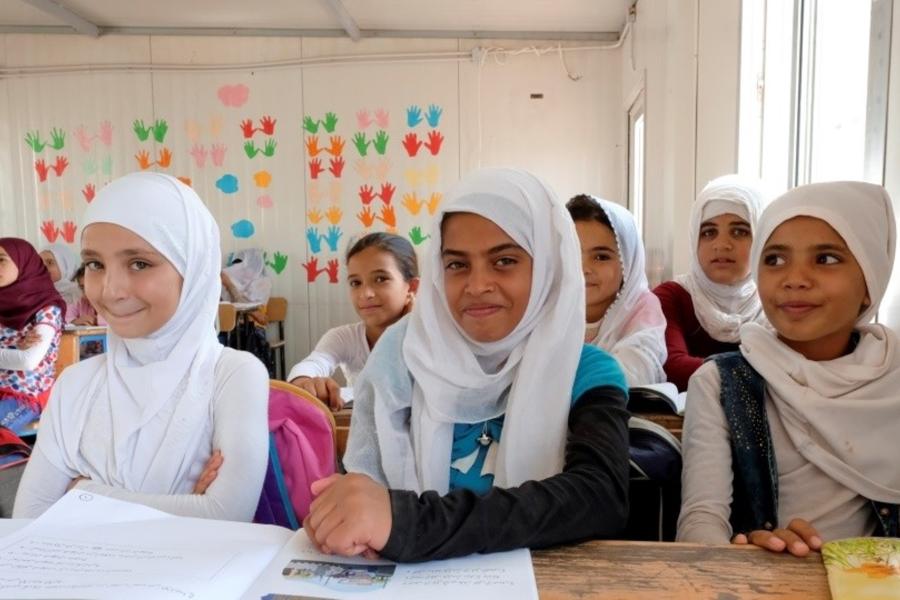UNICEF launches a study to prevent and respond to violence in schools in Jordan
26 August 2021
- The study provides evidence-based recommendations to protect children from violence and its long-lasting effects.

In partnership with the Ministry of Education, UNICEF launched the ‘Diagnostic Study of National Efforts to Prevent and Respond to Violence in Schools in Jordan’. The study provides evidence-based recommendations to protect children from violence and its long-lasting effects.
The diagnostic study comes as part of Safe to Learn, a global initiative to end violence against children in, around and through schools, so children are free to learn, thrive and pursue their dreams. To date, 15 countries have endorsed Safe to Learn's Call to Action, with Jordan being the second country in the region, after Lebanon.
“Today’s launch of the Jordan Safe to Learn Diagnostic Study reflects the high commitment of the Ministry of Education and partners to unlock the multiple wins of ending violence in and around schools,” said Tanya Chapuisat, Representative, UNICEF Jordan.
“These wins include improving students’ learning outcomes, improved investments in education, and behavioural change towards violence against children. But most importantly, it will help the Government of Jordan to reap the long-term benefits of education, and secure future economic growth.” she added.
School violence, including bullying, both in person and online can be devastating for children. Its consequences include difficulty to concentrate in class, missing class, avoiding school activities, playing truant or even dropping out-of-school. This has an adverse impact on students’ academic achievement and future education and employment prospects.
Recent global evidence from the Global Partnership to End Violence against Children/ Safe to Learn and The World Bank shows that society pays a heavy price as a result of violence in and around schools, amounting to an estimated $11 trillion in lost lifetime earnings.
The Secretary-General of the Ministry of Education, Dr. Nawaf Al-Ajarmah indicated that Jordan is a pioneer among countries when it comes to preventing violence in schools, by adopting several policies, legislation and procedures to be implemented at all levels and include all parties of the educational process. Dr. Al-Ajarmah further noted that Jordan is among the (15) countries that have endorsed the Call to Action to Prevent Violence in Schools adopted by the partners of the Safe to Learn Initiative, that was launched at the World Education Forum with systematic and advocacy objectives.
Dr. Al-Ajarmah stressed that under the educational role, the Ministry seeks to implement these objectives and promote positive practices to prevent violence in schools, as it is part of the state system.
He further highlighted the distinguished role of the Ministry in partnership with UNICEF and other strategic partners in implementing the ‘Diagnostic Study of National Efforts to Prevent and Respond to Violence in Schools in Jordan’, as part of the global initiative that Jordan joined in May 2020. This initiative will complement efforts and motivate further work towards preventing violence and promoting a safe environment and positive learning.
The Government of Jordan has taken concrete measures in ending violence against children. Some of these measures include the ratification of the Convention on the Rights of the Child in 1991; the implementation of a national programme “Ma’An” to end violence in schools launched by the Ministry of Education and UNICEF under the Patronage of Her Majesty Queen Rania Al-Abdullah in 2009.
Those efforts resulted in significant drop of verbal and physical violence. Between 2012 and 2019, the cumulative results of the Ma’An programme showed a drop in verbal violence from 33.4 per cent to 15 per cent, and physical violence from 20.9 per cent to 8 per cent.
Moreover, the results of the 2017-2018 Jordan Population and Family Health Survey (DHS) indicate that between 2012 and last month of the survey, children experiencing psychological aggression at home dropped from 87 per cent to 76 per cent, and physical discipline from 66 per cent to 59 per cent .
“Violence in and around schools is a global phenomenon, which severely impacts educational outcomes and undermines educational investments. Jordan is one of the first countries in the world to undertake a country diagnostic on the issue. Making schools safe, non-violent and inclusive is possible, it is a smart investment and there are proven interventions to do it. said Dr. Howard Taylor, Executive Director, The Global Partnership to End Violence Against Children.
"We call for all governments, civil society organizations, communities, teachers and children themselves to end the violence that undermines education and make sure every child — especially the most marginalized — is safe to learn, in Jordan and every country of the world.” added Taylor.
The diagnostic study proposes a set of key recommendations to end violence against children. In addition to investing resources, the study calls for adoption, implementation and monitoring of laws and policies that end violence against children; strengthening national prevention and response systems to violence against children in schools; and changing behaviours and shifting mindsets to respect the rights of every child to develop and grow in a safe environment, free from violence.
The diagnostic study was funded by the United Kingdom Foreign, Commonwealth & Development Office. UNICEF’s work to end violence against children in schools is generously supported by the Governments of the Netherlands, Norway, UK Aid and the United States’ Bureau of Population, Refugees, and Migration.




